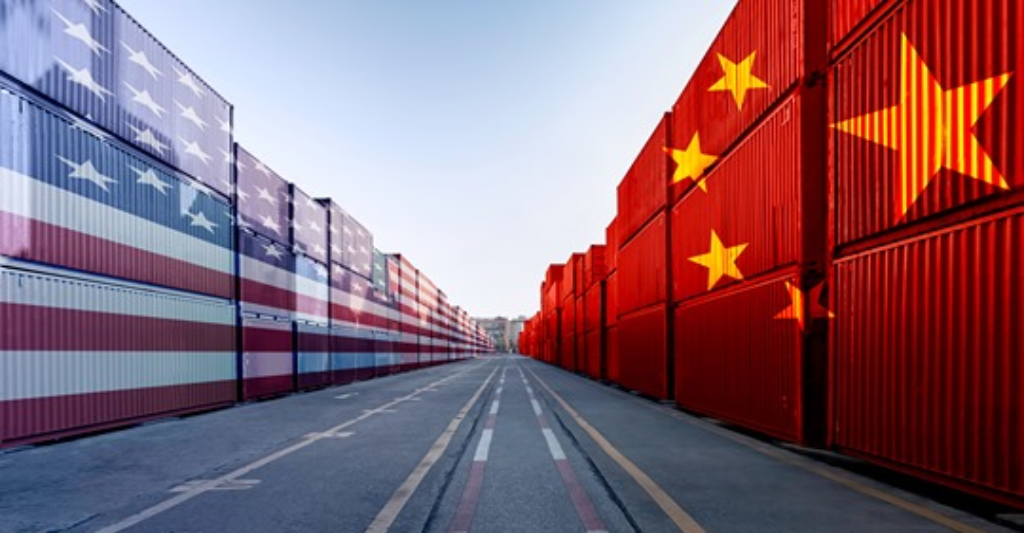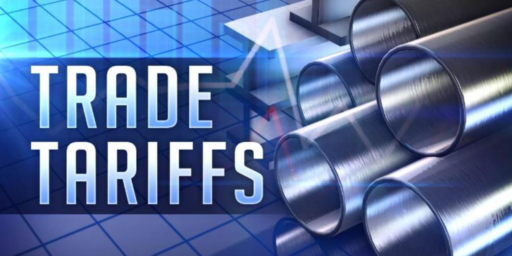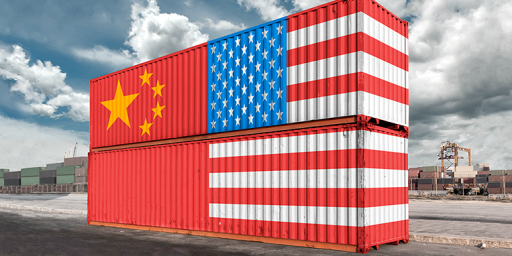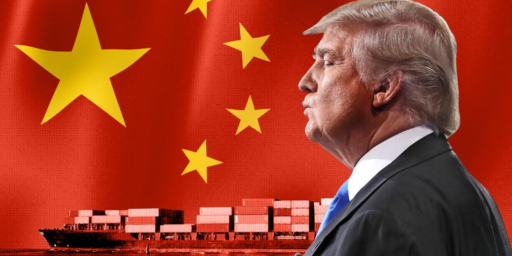Trump’s Foolish Trade War With China Expands

In a sign that the trade war that Donald Trump started seventeen months ago is nowhere close to ending, China announced a new round of retaliatory tariffs against American goods only to be followed by the President upping the ante on his own tariffs, a sign that the trade war is far from coming to an end:
WASHINGTON — President Trump said he would increase taxes on all Chinese goods and demanded that American companies stop doing business with China as his anger toward Beijing and his Federal Reserve chair boiled over on Friday.
Twelve hours after China said it would retaliate against Mr. Trump’s next round of tariffs by raising taxes on American goods, Mr. Trump said he would bolster existing tariffs on $250 billion worth of Chinese goods to 30 percent from 25 percent on Oct. 1.
And he said the United States would tax an additional $300 billion worth of Chinese imports at a 15 percent rate, rather than the 10 percent he had initially planned. Those levies go into effect on Sept. 1.
“China should not have put new Tariffs on 75 BILLION DOLLARS of United States product (politically motivated!)” Mr. Trump said on Twitter. “Starting on October 1st, the 250 BILLION DOLLARS of goods and products from China, currently being taxed at 25%, will be taxed at 30%.”
In a series of angry tweets earlier in the day, Mr. Trump called for American companies to cut ties with Beijing and said the United States would be economically stronger without China. Those comments sent stocks plunging, helping push the market to its fourth straight weekly loss. The president also called the Fed chair, Jerome H. Powell, an “enemy” of the United States and compared him to President Xi Jinping of China, his trade nemesis, after Mr. Powell declined to signal an imminent cut in interest rates.
Mr. Trump has been counting on Mr. Powell to help blunt the effect of his trade war by cutting interest rates to keep the economy humming. While Mr. Powell said on Friday that the Fed could push through another cut if the economy weakened further, he suggested that the central bank’s ability to limit economic damage from the president’s trade war was constrained.
“My only question is, who is our bigger enemy, Jay Powell or Chairman Xi?” the president tweeted.
Mr. Trump’s tariff announcement came after financial markets had closed for the day. But his earlier response to China had already unnerved investors, who worry that the trade war between the world’s two largest economies will further drag on global growth. Stocks fell sharply on Friday, with the S&P 500 closing down 2.6 percent. The Dow Jones industrial average was down slightly more than 2 percent and the technology-heavy Nasdaq index fell 3 percent.
Behind the tirade was the growing reality that the type of trade war Mr. Trump once called “easy to win” is proving to be more difficult and economically damaging than the president envisioned. Mr. Trump’s stiff tariffs on Chinese goods have been met with reciprocal levies, hurting American farmers and companies and contributing to a global slowdown.
On Friday, China said it would increase tariffs on $75 billion worth of American goods, including crude oil, automobiles and farm products like soybeans, pork and corn in response to Mr. Trump’s plan to tax an additional $300 billion worth of Chinese goods in September and December.
The higher rates will only aggravate the financial pain from the trade war, which is already raising prices for businesses and consumers across the globe. Even before the new 30 percent rate, Mr. Trump’s existing tariffs were expected to cost the average American household more than $800 a year, according to research by the Federal Reserve Bank of New York. And Mr. Trump’s next $300 billion tranche will affect consumer products like toys, smartphones and clothing.
Retailers said the president’s actions were inflicting pain on American businesses and the economy.
“It’s impossible for businesses to plan for the future in this type of environment,” said David French, the senior vice president for government affairs at the National Retail Federation.
Here are the President’s tweets on the trade issue from yesterday, both those in the morning in reaction to the Chinese retaliation and the increased tariffs announced yesterday afternoon:
We’re basically at the point now where repeating the arguments against what the President is doing here is becoming redundant. Anyone who has taken a basic economics education knows that tariffs are, generally speaking, a bad idea because they end up causing more harm to the economy of the nation imposing the sanctions. We’ve seen plenty of evidence of this is the eighteen months since President Trump began this trade war with the imposition of tariffs on steel and aluminum that had the impact of increasing the domestic cost of those products, raising prices for manufacturers that rely on these raw materials, and eventually raising prices for consumers who buy everything from washing machines and dryers to automobiles. From there, the war expanded in a tit-for-tat manner that we’ve become used to at this point and has been shown to have a measurable impact on the economies of both the United States and China. Despite that, both nations appear locked in battle at this point and efforts to reach a resolution have been utterly unsuccessful.\
All of this is happening at the same time economic analysts are warning that Trump’s trade war could push the world economy into recession. This is one of the factors that the Federal Reserve Board cited in its recent decision to cut interest rates, a policy it said it may continue if there is further evidence that the trade war is harming the economy. While President Trump has claimed, against all of the available evidence, that it is China and other targeted countries that are paying the tariffs that he has imposed, the reality is that the tariffs are paid by importers who pass them on to their American customers who then pass them on to American consumers. Indeed, Trump himself seemed to acknowledge this when he delayed the implementation of tariffs on consumer goods imported into the United States until nearly the end of the holiday shopping season. Originally, of course, those tariffs were supposed to go into effect on September 1st. Obviously, if the President really believed that a trade war was costless to the economy and American consumers, he would not have made a decision like this. The irony of all of this, of course, is that it may end up being the President’s own obsession with tariffs that causes the economic downturn prior to the 2020 election that he obviously fears. If that’s what happens, then he will likely get what he deserves at the ballot box. But it will be the rest of us who end up paying the price for it.
As I’ve noted in the past, the arguments that these tariffs help either American industry or the American economy are nonsense. In the end, higher tariffs end up being paid by American consumers, by American businesses that depend on international trade such as the agriculture industry, and by the businesses that rely on the products that are subject to the tariffs. President Trump’s arguments to the contrary notwithstanding, there is no economic benefit at all to tariffs and a heck of a lot of negative. Despite that, the Trump Administration appears committed to this ill-advised, self-destructive policy.






What Atriosnsaidna few minutes ago,
I flat out guarantee there is personal pique in this. Some years back, Trump Inc. proposed a Trump Tower Beijing or Shanghai and got immediately shut down. And now he’s peeved for perpetuity and is “punching back.”
In the midst of this trade dispute, we are hearing very little from the business community. Are the leaders of companies that engage in significant amounts of trade with China in favor of these policies? If my company is using a lot of Chinese manufacturing to make stuff to sell in the US, this is being done to compete in the American marketplace; at least, I doubt that the CEOs of Apple and Walmart have a goal of hurting America by helping China. The NAM website seems to be blandly in favor of rejiggering the current US/China relationship; is this the sentiment of the American community in general?
I personally don’t have much faith in the wisdom of academic economists nor in the wisdom of the business world.
“Our great American companies are hereby ordered to immediately start looking for an alternative to China”
Of course, if any Democrat said this, it would immediately be turned into proof that they are all socialists.
Quite the Chinese economic miracle, according to Dennison. If the US “lost” trillions to China, this means American companies and consumers sent tons and tons of money to China and got noting in return.
It’s a miracle!
@Moosebreath: No shit I saw some RWNJ loon say “This proves he never stopped being a democrat!!!!1”
On a related note, Boris may have mortally shot himself in the trade deal.
Quote:
Daring, isn’t it?
@gVOR08:
A less accommodating approach to China would be a good idea, IF IT WAS COUPLED WITH LOWERING TEADE BARRIERS TO OTHER COUNTRIES TO MAKE UP THE LOST TRADE. Trump”s war of all against all approach to foreign relations is only serving to isolate the US rather than isolating China.
There is a strain of leftism that is highly protectionist.
And if you push back at all, they label you a neo-liberal, Clintonist, and anti-union. God, I hate that.
One of the front pagers at LGM.
$800 to be rid of Trump next year is a bargain.
Trump’s trade war became too complicated, i.e. not “easy to win,” the minute China did the most unexpected thing in the world, something no one could possibly have anticipated, that even God Himself could not have seen coming:
Having been attacked, China fought back.
Trump claiming that he’s got the authority to tell U.S. companies what to do.
I’m surprised that the WSJ isn’t having a fit over this.
You know what we should have done about China? Form a free trade association of all the countries that trade in the Pacific. . . except for China. Hah! Wouldn’t that be brilliant? We could call it the Trans Pacific Partnership.
@michael reynolds: Yeah, I wonder why nobody thought of it. 😛
@Just nutha ignint cracker: That would take somebody with a really uh good brain.
One of the aspects of the trade war that is really undercovered is how it ties into the burning of the Amazon. China is looking to shift where it buys soy beans. One of the countries it’s looking to is Brazil. Most of those wild fires are being set by agra-businesses to increase the size of farms. And what’s a key crop that they are looking to extend? Soy beans.